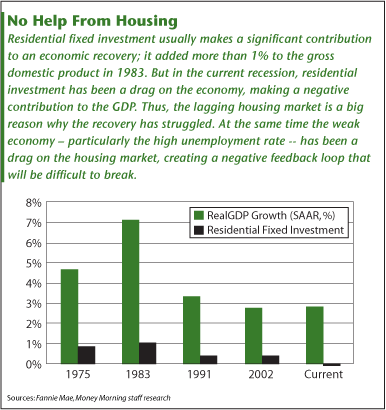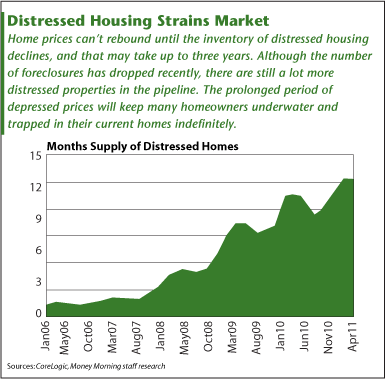U.S. Housing Market Rebound Unlikely Anytime Soon
Housing-Market / US Housing Aug 03, 2011 - 12:00 PM GMTBy: Money_Morning
 David Zeiler writes:
Dragged down by such anchors as a bulging pipeline of foreclosures and a dearth of buyers, it will be many more months - if not years - before a housing market rebound takes hold.
David Zeiler writes:
Dragged down by such anchors as a bulging pipeline of foreclosures and a dearth of buyers, it will be many more months - if not years - before a housing market rebound takes hold.
Symptoms of the limping U.S. economy, primarily an unemployment rate above 9% and weak consumer confidence, along with much stricter lending rules, have helped keep buyers scarce.
Meanwhile, the massive number of foreclosed properties on the market - more than a quarter of U.S. residential sales - keeps pushing prices down. That, in turn, has driven more homeowners into negative equity, further scaring prospective buyers and making new homes much more expensive by comparison.
Report after report tells the story of a market mired in a five-year slump that just can't seem to find any traction.
"Year-over-year, prices continue to deteriorate, although there has been a seasonal uptick over recent months," Stuart Gabriel, director ofUCLA's Ziman Center for Real Estate, told the Los Angeles Times. "This reflects a market that continues to be in search of a bottom."
Grim Statistics
The benchmark Standard & Poor's /Case-Shiller Index illustrates the market's persistent malaise. The May measure of home prices in 20 metropolitan areas rose a lackluster 1% from April - and was down 4.5% from a year ago.
Even the meager 1% monthly increase resulted from a seasonal caveat - prices usually rise in the spring. Analysts foresee little improvement in the months ahead.
"Things do not look very favorable on the housing front since the employment situation has taken a turn for the worse in May and June," Chris G. Christopher Jr., an economist with consulting firm IHS Global Insight, wrote in a research note. "The unemployment rate now stands at 9.2%, and consumer confidence is at depressed levels. Going forward, the Case-Shiller indexes are likely to post increases during the home-buying season, and then turn down again."
Similarly, the annual sales rate of new homes fell 1% from May to June, but was up 1.6% year-over-year. And the actual number - 312,000 - disappointed economists who had expected a rate of 320,000.
To really put those numbers in perspective, consider that at the peak of the housing bubble, July of 2005, the annual sales rate was a robust 1.3 million.
.Many of the issues holding down the housing market are interrelated, which makes them that much more difficult to overcome.
For example, the stubbornly high unemployment numbers, a product of a struggling economy, have meant many would-be buyers can't even think about buying a home. Most are more worried about keeping up payments on their existing home to avoid foreclosure.
Low housing sales, meanwhile, have forced homebuilders to cut back dramatically. Housing starts in June reached a six-month high - and still were less than a third of their peak during the boom.
That feeds back negatively into the U.S. economy. The National Association of Home Builders estimates that each new home on average creates three jobs for a year and generates $90,000 in taxes.
The weak housing sector has been a major drag on the overall economy. Historically housing construction has contributed between 5% and 6% of the nation's gross domestic product (GDP). For the past two years, residential construction has been below 3% of GDP; currently it's just 2.4% of GDP.
"We see no chance that a strong rebound in new-home sales will be a key driver of broader economic growth any time soon," Ian Shepherdson, chief U.S. economist for High Frequency Economics, wrote in a research note.
Demand Choked Off
Another major factor restricting demand has been the far tighter rules on lending enacted following the excesses of the subprime mortgage debacle.

Fannie Mae and Freddie Mac, which together guarantee 90% of the loans in the United States, drastically tightened numerous lending qualifications in the past several years. Borrowers must now come up with more cash for down payments and need to have higher credit scores.
"We screen out about 30% of the people who call looking for a mortgage, usually because of their credit scores," Michael D'Alonzo, president of Creative Mortgage Group, and head of the National Association of Mortgage Brokers, told Bloomberg BusinessWeek. "A lot of people don't even try, because they've heard horror stories of how hard it is to get a loan."
Making matters worse is that many local banks, unwilling to chance rejection by Fannie or Freddie, apply even more stringent standards to loans, known as "overlays."
"Lenders are scared, so they're going to have overlays," Mark Goldman, a loan broker with C2 Financial Corp., told Bloomberg. "What you get, as a result, is the most conservative underwriting in 20 years."
Also contributing to the lack of demand has been the steep decline in prices. Millions of people who bought homes during the bubble now owe far more on their mortgages than their homes are worth, effectively trapping them there.
Research firm CoreLogic estimates that 23% of homeowners - 11 million U.S. households - are "underwater" on their mortgages by an average amount of $65,000. And CoreLogic says another 2.4 million households are close to the edge, with less than 5% of equity in their homes.
A Flood of Foreclosures
Then there are the foreclosures, another whammy from the lousy economy. Millions of people in economic distress simply can't afford their mortgage payments anymore.
Not only do foreclosures add to the excess housing on the market, but the sales price of such distressed properties is 27% lower on average than a conventional sale. Foreclosures made up 28% of all U.S. residential sales in the first quarter of 2011.
While some have taken heart that the number of foreclosures has been cut almost in half this year, the reality is that the flood has simply slowed down - partly because of the fallout from the revelation of fraudulent robo-signing practices late last year, and partly because banks have adopted a more orderly approach.

But the respite in the number of foreclosures now will ultimately prolong the arrival of a housing market rebound.
"According to our numbers, if you just look at the properties in foreclosure or on the banks' books, it will take us three years to work through that inventory at the current rate of sales," Rick Sharga, senior vice president of RealtyTrac, told MSN Real Estate.
For the indefinite future, expect more of the same: stabilizing sales and prices, but no real housing market rebound, except perhaps in the few scattered markets that suffered most from the bursting of the bubble.
"Supply is a foregone conclusion to stay high for the next couple of years as foreclosure inventory continues to be there on the resale market,"Richard Dugas, chief executive officer at homebuilder PulteGroup Inc. (NYSE: PHM), said in a teleconference last month. "We're not predicting that it gets better anytime soon."
Source :http://moneymorning.com/2011/08/03/dont-expect-to-see-a-housing-market-rebound-anytime-soon/
Money Morning/The Money Map Report
©2011 Monument Street Publishing. All Rights Reserved. Protected by copyright laws of the United States and international treaties. Any reproduction, copying, or redistribution (electronic or otherwise, including on the world wide web), of content from this website, in whole or in part, is strictly prohibited without the express written permission of Monument Street Publishing. 105 West Monument Street, Baltimore MD 21201, Email: customerservice@moneymorning.com
Disclaimer: Nothing published by Money Morning should be considered personalized investment advice. Although our employees may answer your general customer service questions, they are not licensed under securities laws to address your particular investment situation. No communication by our employees to you should be deemed as personalized investent advice. We expressly forbid our writers from having a financial interest in any security recommended to our readers. All of our employees and agents must wait 24 hours after on-line publication, or 72 hours after the mailing of printed-only publication prior to following an initial recommendation. Any investments recommended by Money Morning should be made only after consulting with your investment advisor and only after reviewing the prospectus or financial statements of the company.
Money Morning Archive |
© 2005-2022 http://www.MarketOracle.co.uk - The Market Oracle is a FREE Daily Financial Markets Analysis & Forecasting online publication.



